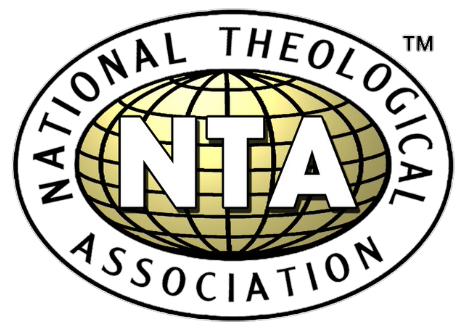Accreditation
The National Theological Association (NTA) accredits theological institutions that uphold high standards of academic excellence, institutional integrity, and evangelical commitment.
Table of Contents
-
Accreditation Overview
-
Eligibility Criteria
-
Accreditation Types
-
NTA Guidelines
-
Accreditation Process
-
Maintaining Accreditation
-
Duration & Renewal
-
Accreditation Fees
-
Benefits of Accreditation
-
Downloadable Resources / Forms
-
Contact for Accreditation
1. Accreditation Overview
NTA’s accreditation process evaluates theological institutions and academic programs to ensure they meet rigorous, internationally recognized standards. Evaluation focuses on:
-
Curriculum design and program structure
-
Faculty qualifications and academic credentials
-
Student learning outcomes and assessment methods
-
Institutional governance, administration, and quality assurance
2. Eligibility Criteria
Institutions seeking NTA accreditation must:
-
Be legally registered and operating as a theological educational institution
-
Serve theological education within Asia
-
Affirm the World Evangelical Alliance Statement of Faith
-
Have been operational for at least two full academic years
3. Accreditation Types
NTA offers the following types of accreditation:
-
Institutional Accreditation – for the entire institution
-
Program Accreditation – for specific degree or diploma programs
4. NTA Guidelines
Purpose
To provide a structured framework and clear expectations for institutions seeking accreditation from NTA.
Scope
Applies to all theological institutions applying for initial accreditation or renewal.
Accreditation Standards
Institutions must demonstrate excellence in the following areas:
-
Curriculum and Program Structure
-
Faculty Qualifications and Expertise
-
Student Assessment and Evaluation
-
Institutional Governance and Management
5. Accreditation Process
The process consists of four key steps:
Step 1: Candidate Status
-
The institution submits an application for candidacy
-
NTA provides a preliminary questionnaire and orientation materials
Step 2: Self-Assessment
-
The institution conducts a comprehensive self-study based on NTA standards
-
A formal self-assessment report is submitted to NTA
Step 3: Evaluation Visit
-
An NTA accreditation team visits the campus
-
The visit includes interviews, document review, and facility inspection
Step 4: Accreditation Decision
-
The NTA Accreditation Council reviews the report and makes a decision
-
The institution receives either full accreditation, conditional status, or recommendations for improvement
6. Maintaining Accreditation
Accredited institutions must:
-
Submit Annual Reports detailing performance and compliance
-
Participate in Periodic Reviews as scheduled
-
Continuously meet all NTA standards
7. Duration & Renewal
Accreditation is typically valid for five years. Institutions must apply for renewal through a re-evaluation process.
8. Accreditation Fees
A non-refundable application fee and site visit charges apply. A detailed fee structure is provided during the application process.
9. Benefits of Accreditation
Accreditation affirms an institution’s commitment to quality and integrity. It enhances:
-
Institutional credibility
-
Student recruitment and enrollment
-
Recognition across Asia and internationally
10. Downloadable Resources / Forms
11. Contact for Accreditation
📧 Email: info@ntaasia.org
📞 Phone: +91 95500 71038
